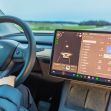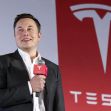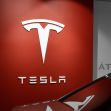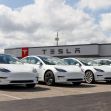A class action lawsuit was filed in U.S District Court for the Northern District of California accusing popular electric automaker Tesla of violating California’s privacy laws.
As one of the most innovative automakers, Tesla employs cutting-edge automotive technology including autonomous driving and dashboard cameras. It’s this same technology that has put the automaker in hot water with this latest lawsuit. The lawsuit accuses the company and its employees of voyeuristic behavior including watching and sharing videos and images of Tesla drivers without their consent.
The lawsuit comes a day after a Reuters report detailed that a group of former Tesla employees was sharing private camera recordings of Tesla drivers internally, without the knowledge of the Tesla owners. The report alleges that several Tesla employees (who have not been named) privately shared these video recordings with each other between 2019 and 2022.
The recordings were shared on platforms including group chats and the company’s internal messaging systems. No evidence of the shared videos and images has been revealed; however, the lawsuit describes the circulated videos and images as being sensitive in nature, containing the personal information, faces, and addresses of Tesla drivers and their families.
The lawsuit describes the videos and images as showing customers in “embarrassing” situations, including one in which a Tesla owner can be seen walking to his vehicle while naked.
Other images allegedly circulated were as mundane as screenshots of drivers, their family members, and even pets that were then turned into memes with captions and commentary. These memes were circulated on group chats and seen by other employees according to the lawsuit.
In the Reuters report, one former Tesla employee explains how the vehicle's video system could capture distinctive information that could identify drivers and sensitive locations such as their home addresses. “We could see inside people's garages and their private properties,” said one former employee. “Let's say that a Tesla customer had something in their garage that was distinctive, you know, people would post those kinds of things.”
The lawsuit was filed by San Francisco resident Henry Yeh. Yeh owns a Tesla Model Y and accuses the company of allowing its employees to access images and videos for their "tasteless and tortious entertainment" and "the humiliation of those surreptitiously recorded."
The attorney representing Yeh, Jack Fitzgerald, shared with Reuters that the action of the former employees violates consumer privacy laws, ones that “the California Constitution scrupulously protects."
While the lawsuit was filed on behalf of Yeh and other “similarly-situated class members, and the general public," the lawsuit does not provide any evidence of the circulated video or images. Additionally, Yeh does not indicate any specific instances in which his sensitive and private personal information was shared by the Tesla employees.
Despite this, the lawsuit is seeking to have a court “enjoin Tesla from engaging in its wrongful behavior, including violating the privacy of customers and others, and to recover actual and punitive damages."
While Tesla has not publicly responded to the lawsuit or reports made by former employees, the company has assured the public about its commitment to privacy regarding its vehicles’ video-capturing system. In a statement released by Tesla, the company explains, “Unless we received the data as a result of a safety event (a vehicle collision or airbag deployment) - camera recordings remain anonymous and are not linked to you or your vehicle.”
The company has also shared that footage captured by Tesla vehicles is stored in the vehicle itself and not on Tesla’s servers. Additionally, video recordings only happen with the consent of drivers after they opt-in to use the service on their vehicle. Drivers are able to disable video capturing capabilities at any time as well.






